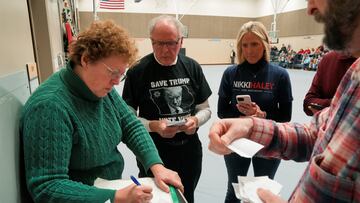Can independent voters vote in a primary?
With the first hurdle for choosing candidates for this year’s presidential election out the way, the battle lines have been drawn.


Independent voters, also known as unaffiliated or No Party Preference (NPP) voters, can have the opportunity to participate in primary elections in “open primaries” or “partially-open primaries”, depending on their location and also which party they are supporting.
Related stories
In open primaries, voters are not required to be affiliated with a specific political party to participate and can choose which party’s primary they want to vote in on the day of the election. This means voters can choose a candidate across party lines.
In states with closed primaries, only voters registered with a specific party can participate in that party’s primary. Independent voters may need to re-register with a political party or take other steps to participate in a closed primary.
How primaries work in each state
States with Closed Primaries
- Delaware
- Florida
- Kentucky
- Nevada
- New Mexico
- New York
- Pennsylvania
- Wyoming
Partially Closed Primary States
- Connecticut
- Idaho
- Kansas
- Maryland
- Oklahoma
- Oregon
- South Dakota
- Utah
- West Virginia
Partially Open Primary States
- Illinois
- Indiana
- Iowa
- New Jersey
- Ohio
Open to Unaffiliated Voters Primary States
- Arizona
- Colorado
- Kansas
- Maine
- Massachusetts
- New Hampshire
- North Carolina
- Rhode Island
Open Primary States
- Alabama
- Arkansas
- Georgia
- Hawaii
- Michigan
- Minnesota
- Mississippi
- Missouri
- Montana
- North Dakota
- South Carolina
- Tennessee
- Texas
- Vermont
- Virginia
- Wisconsin

